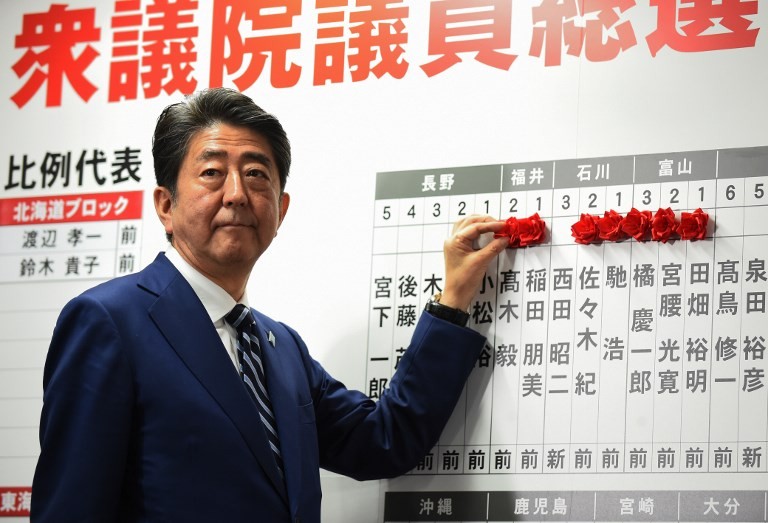Popular Reads
Top Results
Can't find what you're looking for?
View all search resultsPopular Reads
Top Results
Can't find what you're looking for?
View all search resultsWith $890 billion in cash, Japan M&A set for `biggest year ever'
Change text size
Gift Premium Articles
to Anyone
 Japan's Prime Minister and ruling Liberal Democratic Party leader Shinzo Abe puts rosettes by successful general election candidates' names on a board at the party headquarters in Tokyo on Oct. 22, 2017. Japan outmuscled China to dominate mergers and acquisitions in Asia last year, and with companies in possession of more than $890 billion in cash, the spending spree is likely to continue in 2019. (Agence France -Presse/Toru Yamanaka)
Japan's Prime Minister and ruling Liberal Democratic Party leader Shinzo Abe puts rosettes by successful general election candidates' names on a board at the party headquarters in Tokyo on Oct. 22, 2017. Japan outmuscled China to dominate mergers and acquisitions in Asia last year, and with companies in possession of more than $890 billion in cash, the spending spree is likely to continue in 2019. (Agence France -Presse/Toru Yamanaka)
J
apan outmuscled China to dominate mergers and acquisitions in Asia last year, and with companies in possession of more than $890 billion in cash, the spending spree is likely to continue in 2019.
Japanese companies announced more than 1,000 offshore acquisitions totaling a record $191 billion last year, led by Takeda Pharmaceutical Co.’s blockbuster takeover of Shire Plc, according to data compiled by Bloomberg. The last time Japan overtook China by that measure was in 2012.
Faced with a shrinking population and stagnant economy, Japanese businesses have been increasingly looking overseas as trade-war tensions depress stock prices and bolster the value of the safe-haven yen. Combine that with the massive war chest that Japanese firms from SoftBank Group Corp. to Toshiba Corp. have amassed, and bankers are preparing for a prosperous year.
Japanese companies are poised to have the “biggest year ever” in terms of the number of offshore deals, Koichiro Doi, JPMorgan Chase & Co.’s Japan M&A head, said in an interview. The U.S. will be the most sought-after destination, partly because it’s the largest market that’s growing, according to Doi, who said 2018 was the busiest year he’s had in his two-decade-long career.
The number of purchases is bound to increase from industrial, consumer and technology firms, but Japan Inc. is unlikely to spend as much in aggregate, or pull off a deal the size of Takeda’s this year, Doi said. Takeda’s purchase of Shire, scheduled for completion this week, was the world’s largest takeover announced last year. This year, an even bigger deal may be in the offing with Bristol-Myers Squibb’s recent agreement to acquire Celgene Corp.
Japanese businesses have long been looking to expand overseas through acquisitions but their track record, in terms of M&A prowess, hasn’t been too flattering.
In the 80s, as soaring stock prices fueled hubris, Japan Inc. snapped up everything from the iconic Rockefeller Center in Manhattan to California’s Pebble Beach golf course and Vincent Van Gogh’s Sunflowers painting. Sony Corp. and Panasonic Corp. bought Hollywood studios. Many of those investments ended up being sold at a fraction of their cost after the country’s asset bubble burst.
Then there were the acquisitive years at the turn of the century, when buyers including phone-operator NTT DoCoMo Inc., Toshiba and Nomura Holdings Inc. splashed out on overseas trophies such as AT&T Inc.’s wireless unit. The result was billions of dollars in writedowns and a gun-shy approach to foreign deals.
There are signs that Japan has learned from its mistakes as Japanese acquirers are striking harder bargains. Last year, they typically paid about 23 percent more than market value, the lowest premium since 2013, according to data compiled by Bloomberg.
Also, there’s only so much cash companies can hoard before coming under fire from investors.
“Japanese corporations are getting pressure from shareholders to spend money more efficiently,” said Akifusa Takada, head of the M&A practice at the Baker McKenzie law firm in Tokyo. “Not many Japanese companies are very willing to distribute cash to shareholders as dividends. They see these fund as resources to expand business overseas.”
Companies sitting on excess cash are now more likely to become a target for activist investors so there’s an incentive for boards to spend surplus funds on takeovers, said Zuhair Khan, an analyst at Jefferies Japan Ltd. Among last year’s targets was Toshiba Corp., which was urged by hedge fund King Street Capital Management to buy back $10 billion of stock.
At $892 billion, cash and cash equivalents at non-financial companies listed on the Nikkei 225 Stock Average have surged from $690 billion in three years, Bloomberg data show.
There are plenty of sellers to choose from. Once-mighty General Electric Co. continues to sell assets, while Chinese conglomerates such as HNA Group Co. and Anbang Insurance Group Co. are unwinding their empires after the government began cracking down on capital outflows by targeting the country’s most prominent acquirers.
Healthcare remains a hot sector, even after the Takeda-Shire deal. Bristol-Myers’ bid for Celgene may fuel more consolidation in the sector, according to analysts.
Then there are falling share prices, which may fall further yet. Concerns about global growth this year have taken hold as China’s economy slows and the U.S.-China trade war drags on. Indexes from Asia to Europe have slumped, while U.S. stocks in 2018 had their worst year since the financial crisis. That’s good news for Japanese companies looking for acquisitions, according to Jefferies’ Khan.
“It could be a very good year for overseas M&A,” said Khan. “To the extent there’s a pullback in valuation multiples, it’ll make overseas M&A much easier.”









